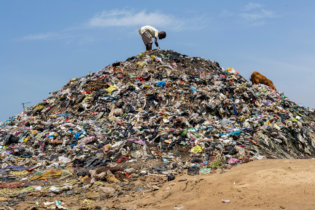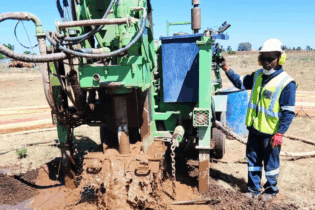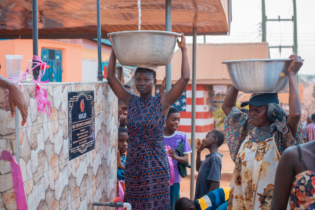Water resource management on an urban planet
Water is a prerequisite for human and ecosystem health, as well as for the success of a wide range of industrial and agricultural enterprises. Water security through responsible resource management is an essential safeguard for sustainable urban environment. Water&Sanitation Africa speaks to Aurecon, an organisation that is focused on delivering technical, economic, social and environmentally-friendly solutions that aim to meet the water needs of communities across the globe.
Water security and supply
In 2010, global warming may be the headline-grabbing issue, but water security and supply is a significant social and environmental concern for many countries aroundthe world.
At a humanitarian level, many countries around the globe are currently on track to meet or even exceed the Millennium Development Goals concerning safe drinking water, so that the number of people without access to safe water might behalved by 2015. At a consumer level, the public is becoming increasingly concerned about, and aware of, the protection of the natural environment. Recycling water is becoming as widely accepted as any other form of recycling.
Supply and treatment: the three R’s
Water reclamation, recycling and reuse are part of a continuum that begins with the treatment of wastewater and ends with the resultant potable or non-potable product being used by a designated target, depending on the level of treatment (e.g. greywater starts off with zero treatment). Water reclaimed from wastewater or polluted stormwater by conventional treatment has long been recognised as an important potable or non-potable source in urban environments, but also to help restore over-utilised streams and wetlands. Water industry groups and water professionals now recognise that the technologies which yield the highest grade water for reuse – ultrafiltration,reverse osmosis and ultraviolet disinfection – have become more affordable and more effective options to deliver safe bulk water. Looking to the future, water reuse has the potential to make a huge difference to water security for cities around the world. Unfortunately, the impact on supply continuity due to water reuse has been mixed, with a significant proportion of water suitable for reuse probably still being wasted.
With many growing cities facing the prospect of ongoing water shortages, high grade urban water reuse offers an attractive economic option to support water derived from large dams, groundwater aquifiers, river abstractions or desalination. Desalination
In 2010, numerous desalination projects are being delivered to cities and communities around the globe. The Global Water Intelligence report, Desal Data/Desalination Markets 2010, puts overall global capital expenditure at US$9.2billion. The report states that: ‘Growth was driven by major programmes in Spain, Algeria and Australia, as well as by frenetic activity in the Gulf region in general, and Dubai in particular1.’ In addition, both China and India will probably emerge as major markets for desalination as urban growth continues. According to Professor André Görgens, Aurecon’s Water Sector leader in Africa Middle East, coastal cities in South Africa will increasingly need to turn to desalination to meet the growth in their water needs. Professor Görgens believes that 20 years from now, desalination will become what he calls “a standard option” for augmenting water security in South African coastal cities. With much of Australia, areas of New Zealand, Asia and Africa having been in the grip of record-breaking droughts, desalination is seen as a solution to uncertain water supplies for major coastal cities. However, desalination is only one element of a larger, multi-pronged and holistic approach required to achieve water security and continuity of supply to communities. Once the bulk water is available, no matter what the means of sourcing it, the next challenge is to effectively deliver it to people and locations. How this is achieved is dependent on geographical, economic, social and political factors, as well as the availability, or affordability, of infrastructure to supply communities. Recycling
With the prospect of drier and longer summers facing many communities, water for irrigation is becoming a critical issue. Recycled water is suitable for use in food growth, municipal environments (for parks, gardens, recreational facilities, etc.) or in greywater networks for use by industry or communities. Most recycled water is used for crop irrigation, landscaping, golf courses and public parks and gardens. However, the extent of treatment of the recycled water depends on where the water ultimately goes. This means that, if people are more likely to come into direct contact with it, the water must undergo more treatment than if itwere to be used in an oil refinery or in cooling towers at a power station. Within the Asia Pacific region, practices such as generating recycled water from raw sewage has been identified as one of the potential sources of water for use in irrigation. “Aurecon is increasingly being called upon to undertake and deliver feasibility studies which provide information to enable recycled water users to assess costs and risk tradeoffs, and also facilitates a decision if they want to progress to abusiness case,” said William Yong, general manager: Water, Asia Pacific, Aurecon. “Typically, our investigations aim to establish the feasibility and costs of a scheme to extract, treat, store and distribute recycled water for use. Recycled water schemes are demand-driven and a critical task is to establish the totaldemand profile for recycled water for all options being considered. Whether we are involved in urban or rural water supply, irrigation or drainage, we cover the project lifecycle from feasibility studies and master planning through to detailed design and actual delivery of water.
“A key strength we have as a global group is that we are able to leverage on the expertise and knowledge that exists within our various centres of excellence in terms of treatment, storage and delivery in Asia Pacific and Africa, to create innovative and holistic solutions for clients.”
Bulk water supply – water reconciliation studiesIn South Africa, water resources management is increasingly being supported by a series of water reconciliation studies. These studies involve the use of innovative tools developed by Aurecon, which forecast and manage supply and demand on a community by community basis. “Historically in South Africa, each municipality or metro would develop their own water services development plan, sometimes without taking our government’s overarching water resource management strategies into account,” says Professor Görgens. “These master plans are primary building blocks for water security across the nation and are especially topical in light of growing urbanisation within rapidly developing countries like South Africa.
“For our part, Aurecon has been working closely with many municipalities and national government to assess and resolve bulk supply and demand priorities. To this end, we developed an in-house water reconciliation tool which we then use to analyse water balance scenarios for the medium- and long-term future and highlight suitable interventions for each scenario. This approach is cutting-edge in terms of ensuring water security, not just for countries like South Africa, but for many other developing nations. We used this tool very successfully in the Western Cape and Algoa Reconciliation Studies, which were commissioned by our national Department of Water Affairs to develop regional strategies to secure a sustainable future water supply for the Greater Cape Town region, the Nelson Mandela Metropolitan Municipality and the Coega Industrial Development Zone in Port Elizabeth. It is intended that these regional strategies guide the optimal selection of interventions and studies to meet anticipated future water requirements, resultingin the ongoing and vital provision of water according to sustainability principles.” adds Professor Görgens Catchment and drainage management
At the other end of the urban water spectrum is catchment and drainage management planning. With the likelihood of more extreme storm events occurring more frequently due to climate change, the importance of developmentassessments, flood risk assessment, emergency management planning input and flood and storm tide inundation modelling studies cannot be underestimated. “Our philosophy is to invest time and effort in the data acquisition stage, ensuring useful information in order to produce useful results,” said William Yong. “We have invested in developing our technical specialists and in acquiring the most up-to-date modelling software. We are not affiliated with any particular software developer, and will recommend the right package for the right solutionon a case by case basis. This is part of our global competencies and integration programme. We now draw upon resources right across our business to deliver water projects that utilise the whole team, no matter where they are located. “Around the world, we maintain close ties with many universities and other research institutions, enabling us to stay at the forefront of research and development, as well as augmenting our capabilities with support services suchas physical modelling. “On a broader project basis, our network of water specialists work together to leverage experience and skills on a myriad of projects. We now have colleagues from Africa based in our Asia Pacific offices who bring greater depth to our water resources management and planning capability in the municipal market, together with water management and regulatory capacity in the mining and industrialmarketplace. “Equally, we have one of our specialist mechanical engineers from Asia Pacific working in the Olifants River Water Resource Development Project Phase II in South Africa. This is part of our global competencies and integration programme. We now draw upon resources across our business to deliver water projects that utilise the whole team, no matter where they are located.” Challenges and opportunities
Water security is one of the great challenges of the 21st century. It is a challenge that governments, business leaders and technical consultants must address in unison. Traditionally, public sector leaders and nongovernmental organisations have driven the debate on water policy, but a growing number of progressive private-sector companies have begun to work with consultants to effectively manage water resources and usage. To address usage concerns, progressive companies are developing technologies that deliver more products for the water they use during production. Other companies are developing new technologies for treating water and wastewater to improve resource utilisation. One thing is certain, the water security and management debate will continue to evolve and broaden over time. Positive outcomes are being discussed, designed and implemented. In the meantime, engineering, management and technical services companies such as Aurecon will continue to deliver innovative and practical solutions that address the needs of the urban water marketplace – now and in the future.






